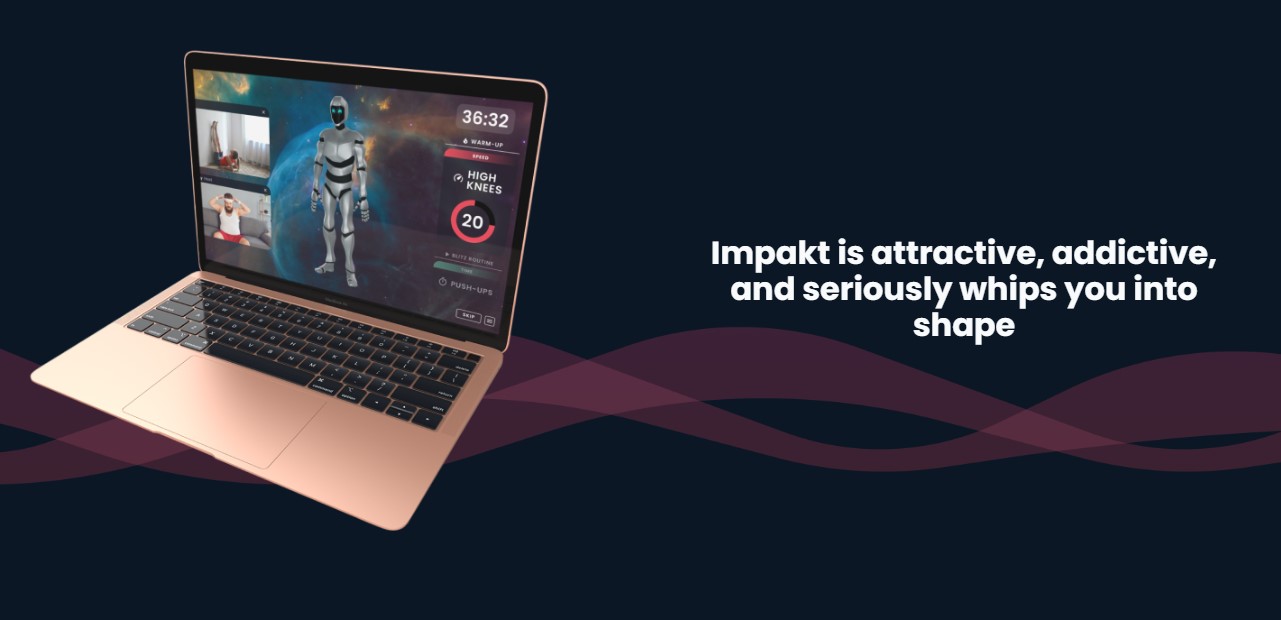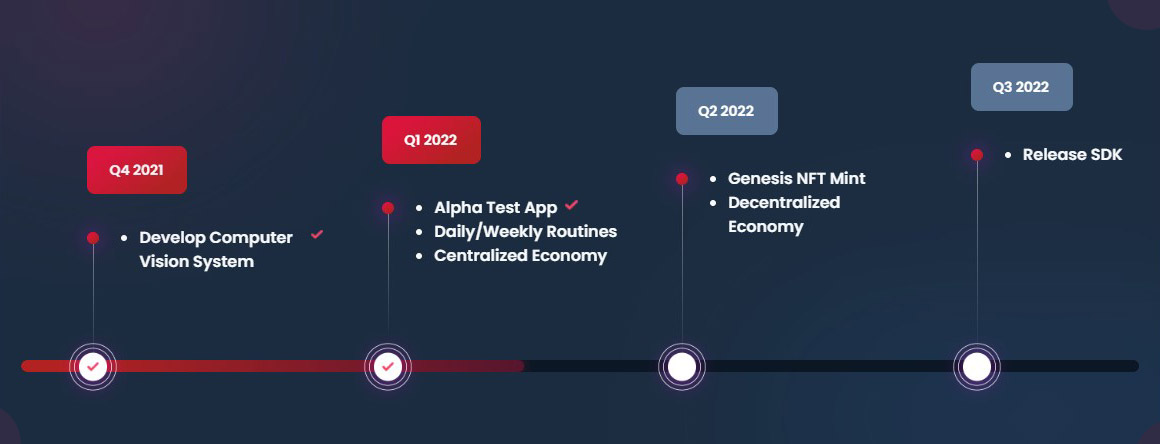As cryptocurrencies like Bitcoin and Ethereum became more mainstream, smaller subsets of communities are innovating at a breakneck pace. Crypto is just a small part of what will make up the Web 3.0 universe— a world where people can perform transactions, socialize, start businesses, create works, and exercise in a marketplace where value is fairly distributed to creators and investors.
If you think about it— nothing has changed. Even with the onset of technology, humans still face the same difficulties they had 100 years ago, and much of it comes down to the human psyche. Humans are used to taking the path of less resistance. When it comes to the adoption of the metaverse, the kindling is in place, but it’s not quite enough to catch fire.
Take fitness for example. There are countless ways to partake in exercise these days, even amidst the pandemic, many fitness studios shifted to live streaming formats to retain their loyal customers. Group fitness classes act as a social binder, meaning people are more willing to go to a group class and be guided along by an expert in a room where ten or twenty people are doing the same thing. However, fitness classes are generally not designed to be universal. Every body has different needs, perhaps you’re a little older, or you lack mobility in certain areas. Forcing ourselves to stick to routines that consistently puts excess strain can lead to diminishing returns on motivation. Our bodies and minds register this as pain— making us less likely to go back to the same activity.
The reason why this happens is that fitness classes are usually designed by high-performance athletes. They lack personalization and while you can get personalization by hiring trainers, it’s going to cost you a pretty nickel.

The team at Impakt have thought this through carefully. They’re looking at the success of Gamefi and creating an application that combines both intrinsic (health and longevity) and external (crypto, tracking, competitions) motivations to ultimately aid people in achieving consistency in their fitness habits. When sitting down with John Keh, a lively and composed entrepreneur of Taiwanese descent, he revealed that most of his journey up until now had nothing to do with cryptocurrency nor any major technological innovation. Mostly, John spent his time in the food delivery and restaurant business, from coming up with ambitious plans to scale delivery services across the West Coast, to perfecting the famous Hainan chicken recipe for a handful of restaurants he started across the Bay Area, Berkeley and San Jose. He’s also spent a few years after graduating from UC Berkeley joining the U.S. Airforce instead of pursuing a career in finance.
He shares what is most important in scaling a successful business: resilience, open-mindedness, and building communities.
Walk us through how it all started. You’ve made some significant exits early on in your career, including the acquisition from Block (formally Square) for Caviar. How did it go from that to what you’re doing now with Impakt?
I joined Caviar as the third employee and I became the first partner. I was asked to launch the New York City office because my family has a long history with the food and restaurant industry in NYC. For example, my granduncle started the first few authentic Chinese restaurants in New York City. My dad built a restaurant paper supply company and his cousin also ran a catering business in Long Island City. They ran cloud kitchens for popular chain restaurants in NYC.
I signed on with Caviar a month out of the military. Within two to three months we had launched 30 to 35 restaurants and we signed on with some pretty popular ones including Mission Chinese Food, Han Dynasty, Blue Ribbon Sushi, and Momofuku. I eventually went on to launch Caviar operations in LA.
Caviar got acquired by Square (Block) and I went on to run West coast operations. After the acquisition, I started my own restaurant because I was curious to see what the other side was like. We created Chick’n Rice, a fast-casual restaurant that served the Thai version of Hainan chicken, called Khao Mun Gai with a special Thai fermented soybean sauce created by my uncle who’s a successful chef.
What did you learn from those food ventures and how did that play a role in your next role at Uber
Throughout Caviar, I learned how to tackle logistical challenges on a per-day basis. After two years of being in the restaurant industry, I was naturally a bit burnt out. I wanted to pivot back to the tech side of things. Thankfully, around this time I got an offer from Uber Eats to run their business intelligence unit for all of the U.S. and Canada. I saw a great opportunity to see things at a large scale: while Caviar was delivering to hundreds of thousands of people; Uber was doing 5 million a week. I also took over the Uber Courier Experience team and was able to implement programs that improved the courier experience, such as Uber Eats Pro.
It sounded like you took a deep dive approach to your life. With every project, it sounds like you challenged your capacity every time – I’m surprised you haven’t gotten burnt out from it all.
So, when I got out of the military I had the mentality of “anything can be done” because I was literally moving troops and lives were at risk. When it came to building Caviar, the everyday problems didn’t seem that overwhelming— I mean what’s the worst that can happen? A lady calls us to complain that her food was cold? Those things could be dealt with easily, at least there’s no one’s life on our hands.
I recommend for people to reach out of their comfort zones and get different perspectives on things. It’s allowed me to approach problems with a calmer mind and it made all these physical challenges not so difficult. You just have to break each problem out and work each piece out and when you work out all these small pieces, actually the whole thing works out.
How early on in your life did you start to build that crucial piece of resilience that’s so important for any entrepreneur?
It started with me throwing myself into the US Air Force. I kind of followed in my family’s legacy where my grandfather was an Air Force Lieutenant Colonel in the Taiwanese military. My dad was a Major in the Taiwanese Army but he had hurt his back so he moved to America. They’ve always encouraged me to join the military.
I graduated with a double major in political science and economy. I was going to go into finance but during that time it was the recession, and banking wasn’t exactly the most appealing option. So I decided to take my family’s advice and joined the military instead. They recruited me to become an intelligence analyst. I got assigned to Korea for two years during an awfully tense time as the North Korean leader, Kim Jong Il had passed away. Then, I went to Germany and operated air assets in the Middle East and North Africa— it was the least to say I was used to jumping into the fire.
How I applied that to my life as an entrepreneur, is that I think of stress as energy. The energy you can channel positively and more productively can make you very successful.
The Journey to Creating Impactful, Social Experiences in the Metaverse
I started a Y combinator company which started as a restaurant wholesale company, then I pivoted to virtual events after COVID-19 hit. However, I passed off being CEO to my co-founder, because virtual events were what he was passionate about where I was less.
From there, one of my co-founders introduced me to the current co-founder of my crypto company and he was very interested in creating a social-online fitness application so people could work out and socialize during the pandemic. We’ve built some great computer vision technology to aid people in their fitness journeys and to be able to recognize body movements and gestures. But we realized as the pandemic was waning, people didn’t want to work out with coaches online because they preferred to have that in-person interaction. Around this time, our CTO began making small games with the computer vision tech.
These games were super fun, especially for us as a remote team as they brought back childhood memories like playing Wi Sports and X-Box Kinnect. We realized this could be a good way to get people up and moving again, engaged, and even earning money. It would be healthy for the body and good for the wallet.
From there, we picked up speed, and now we have a gamified application for fitness out now in Beta (community beta). The public beta is coming out next month.
What problem are you hoping to distill with Impakt?

We understand some fitness routines are difficult to follow and this can lead to a diminishing return of motivation. Thus, we want to allow our members to customize their routines by building a routine builder. The one on our team who’s in charge of making routines is a Nike athlete and an ex-professional boxer; needless to say his routines are fairly difficult, but the routine builder will allow fitness professionals of all types to build their own routines for everyone’s personalized fitness journey.
In regards to motivation, we introduced two concepts of earning. One is the leaderboard which rewards quality and ability. The other is missions, which will reward consistent effort. This means you’ll be rewarded more crypto for earning streaks and will be focused on consistency. There’s also a self-tracking and improvement tract on the way, in which users will be rewarded for self-improvement.

Fitness is challenging for many because we all have busy schedules. For someone to adopt fitness, it has to be something they can fit or adapt to their own lives.
We’re also trying to incorporate a social aspect to enforce accountability. Such as building systems to make players stay accountable to each other: if both players are hitting their exercise goals together, they can be rewarded extra crypto.
The Importance of Community
Without a strong community, projects like this become obsolete. We’re hoping to keep demonstrating and iterating the app based on the responses from our participants to make the app the best it can be. We want it to be adaptable to everyone’s needs, lifestyles, and schedules, and make it an enjoyable way for people to connect and interact with one another through fitness. Currently, we have community groups on Twitter and Discord. It’s completely free to sign up, so I encourage people to try it. I always believe the best way is to show, rather than tell. I have confidence when people see the technology, they will understand the appeal of Impakt.
